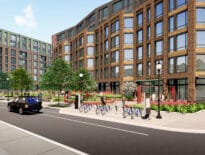Kenan Bigby
Managing director of development, Trinity Financial
Age: 46
Industry experience: 25 years
Trinity Financial is finding opportunities to expand its portfolio through partnerships with housing authorities in Boston and New York that are redeveloping public housing properties into mixed-income communities. This month, the New York Housing Conference named Trinity Financial its 2020 Developer of the Year for its “community-driven” approach to urban housing projects. The group praised Trinity’s diverse team for delivering high-quality projects and its commitment to the communities they serve.
The company first entered the New York market in 2013 with a redevelopment of the Randolph Houses public housing complex in Harlem, and opened a Manhattan office in 2015 that’s overseen a total of 1,110 housing units’ construction with total investment of $661 million. Closer to home, Trinity marked the completion in November of phase two of the Overlook Terrace at Orient Heights project. The partnership with East Boston Community Development Corp. demolished 87 units in four buildings at the Boston Housing Authority-owned property, while constructing 88 public housing apartments and townhomes.
Q: What was the impetus for Trinity’s entry into the New York City market in 2013?
A: Our business strategy has always been to diversify geographically, but do it in a way that we can have a real presence in the communities that we work in. We’re not a firm that’s looking to go national or expand too far, or depend on others to be our boots on the ground. So within those constraints, New York made sense geographically. The challenges there are that it is an insular market and we knew in order to make a real run at it, we needed to do our homework and set up a foundation before expanding. On the plus side, in the affordable housing universe, a lot of folks we’ve done work with in other locations have a New York presence and we could build on existing relationships.
It was serendipitous as we were ramping up those conversions, the New York City Housing Authority issued a request for proposals for Randolph Houses in Harlem, an existing asset they were looking to bring on a private partner to redevelop. At the time, NYCHA wasn’t really known for this model of redevelopment. It was sort of a feeler for how they would incorporate this into their portfolio, and Trinity has experience in other locations. There were historic tax credits involved and a strong and well-established resident association, and all of those things are part of our formula. This seemed like the perfect op to throw our hat in the ring.
Q: How does that project compare with your ongoing transformation of the Orient Heights property in East Boston?
A: There are a lot of similarities. One of the differences between Boston and New York is just the scale of things, the larger universe of development happening, where in Boston something like this would be a big piece of the pipeline, and in New York it’s sort of a drop in the bucket. To bring creativity about how to approach it, we figured out a way to preserve enough of the existing structure to qualify for historic tax credits. We were the only team to suggest that and be able to pull that off. One of our core business principles is the care that we take in our projects and I think the city was relieved they didn’t have to worry about bad press from disgruntled residents who would be mistreated in the redevelopment.
Q: What has Trinity’s experience in these mixed-income conversions taught the firm about best practices to apply to current projects?
A: Phase two was just completed earlier this year and is leasing up, and we’ll move into phase three next year. This is an approach that we have employed throughout the history of the company. We’re big proponents of mixed-income. We want to make sure the redeveloped properties are set up for long-term success and financial viability. Mixed-income is the way to do that. A lot of the problems you see with public housing historically is because they’ve been just that: limited to units that serve only the most distressed or lowest-income members of the community, and a public housing program that has over time invested less and less into upkeep.
In redeveloping these properties, income-mixing is key to make sure there’s not an overreliance on public dollars. That goes up and down, and can change from one administration to the next. The challenge is correcting the perception of these developments, because of time and lack of investment they’ve fallen into disrepair. There’s quality of life and crime issues. Each community has its own set of challenges.
Q: How do you overcome those perceptions when marketing the new units?
A: One is just the quality of construction. We want to make sure the units are comparable. We’ve been aggressive about incorporating sustainability and green technologies that get passed onto residents in reduced energy costs. And there’s clearly initially some discount against top-of-the-market units, so you’re getting as good or better than other units at a better price point. It also comes down to the people working on the site – the community managers and maintenance and resident service folks – working really hard to create a sense of community that is inclusive and appeals to a wide array of residents. We manage them to the high standard of market-rate housing.
Q: In evaluating developments in Massachusetts’ Gateway Cities, what are your criteria?
A: There’s a handful of Gateway Cities that have been actively prospecting. We’re active in Lawrence, Worcester, Brockton and also done some work in Lowell. The factors we look at are the leadership and vision of the administration there: Do they have a plan or at least a willingness to work with developers? Do they have a strong planning department? A streamlined or efficient approach to permitting? And access to transit is another one. We’re big proponents of transit-oriented development. And then it’s looking at the underlying economics: Do we see growth potential? As a company, we aren’t shy about being first in. But we want to at least see a progression or a possibility, so our investment will remain sound going forward.
Bigby’s Five Favorite Local Breweries:
- Trillium Brewing Co.
- Widowmaker Brewing Co.
- Vitamin Sea Brewing
- Dorchester Brewing Co.
- Castle Island Brewing Co.




 |
| 

